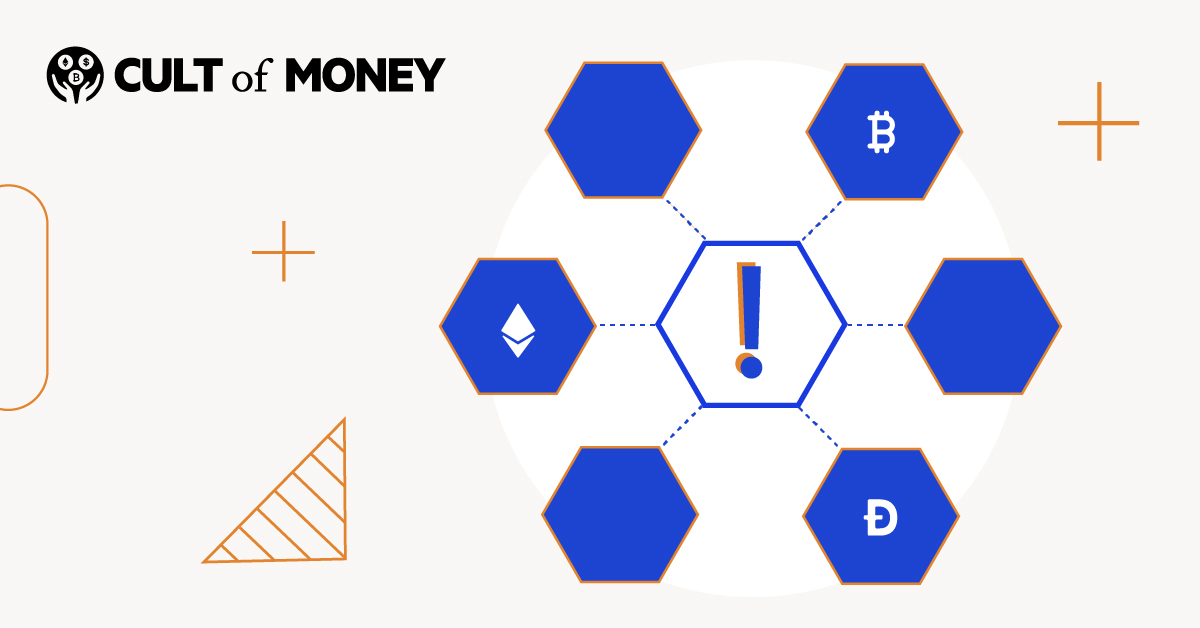
One of the easiest ways to buy, sell, and trade cryptocurrency is through exchange.
However, not all exchanges are the same. In fact, even though decentralization is one of the main selling points of cryptocurrencies, some exchanges are centralized.
While centralized exchanges can make managing your crypto easier, it doesn’t mean you can fully trust them. Let’s look at centralized cryptocurrency exchanges and what you need to know before entrusting your coins to their keeping.
What Is A Centralized Exchange (CEX)?
The original idea behind cryptocurrency was to create a decentralized system to send and receive money. No one person controls a truly decentralized network. With blockchain technology, the idea was to create a public ledger where people could view transactions. The transactions are verified using a consensus mechanism.
Decentralization is supposed to make transactions “trustless,” meaning that you don’t need to know the other party — and you don’t need a “trusted” third party to complete the transaction.
Decentralized exchanges (DEXs) are designed to allow interested parties to exchange cryptocurrencies and other digital assets. There isn’t a single authority in charge of a DEX. The transactions are managed on the blockchain. In many cases, participants that provide liquidity to the exchange receive a portion of the fees charged in each transaction.
Centralized exchanges (CEXs) allow you to buy, sell, and trade crypto, but they are owned and operated by a single authority. Many of them are owned and operated by a company that keeps any applicable fees as part of their profit. These companies set the rules and even decide which cryptocurrencies are listed.
Related: 8 Best Cryptocurrency Exchanges
Why Do People Like Using Centralized Exchanges?
So, if a centralized exchange appears, on its face, to fly in the face of the basic tenets of decentralization, why do people use CEXs? Here are some of the reasons some people like using centralized exchanges:
Easy to use. Centralized exchanges are easy to use. The interface is often intuitive, and you can buy cryptocurrencies quickly and easily.
Smaller learning curve. Because centralized exchanges are often set up to look similar to simple stock investing apps, the learning curve is smaller. Learning to use a DEX can require a little more time and effort.
Use fiat currency for purchases. Many DEXs require you to have crypto and trade that crypto for another crypto. With a centralized exchange, you can usually make your purchase with a debit card, PayPal, or bank transfer. This can make sense for investors looking to buy tokens and not get involved deeply in decentralized finance (DeFi).
Store cryptocurrencies. A centralized exchange keeps track of your tokens and their value. You can easily store them on the exchange without the need to learn how to use a crypto wallet. It’s possible to transfer your digital assets from an exchange to your own digital wallet, but you’re not required to.
Feeling of security. Finally, many investors feel like there’s an element of security with a centralized exchange. Some exchanges carry theft and cybersecurity insurance, so your assets are protected if someone hacks into the exchange. Additionally, some centralized exchanges submit to some level of regulation, so there’s the appearance of accountability.
Even though these are reasons that some like using CEXs, it doesn’t mean you should trust an exchange with your digital assets.
5 Reasons To Avoid Trusting A Centralized Cryptocurrency Exchange
Before you decide how you want to set up your personal cryptocurrency ecosystem, it’s important to understand the drawbacks of CEXs — and why you should be wary of trusting them completely.
1. Custodial Wallets
When you keep your crypto on a centralized exchange, you don’t have control of your private keys. Instead, your coins are kept in a wallet controlled by the exchange. The exchange stores the cryptocurrencies on your behalf. You have your account login information, but you don’t control the keys to your wallet.
If you want direct control over your crypto, you need your own noncustodial wallet. One approach for those who want the ease of using an exchange while maintaining control of their crypto is to use the exchange to buy tokens but then send those to your own external crypto wallet. You get the ease of making a purchase on the exchange, but you control your crypto. Transfer the coins as soon as possible to reduce the amount of time the CEX has direct control of your crypto.
2. The Exchange Makes Its Own Rules
A centralized exchange can make its own rules — and change them at will. In general, a decentralized exchange has rules built into its code. If the DEX is built on a blockchain that requires consensus, changes to the rules are often put to a vote. As a result, it’s often harder to adjust a DEX's operations than to change how a CEX works.
Don’t forget that a CEX can also stop you from withdrawing funds. If it decides to, it can freeze your account and refuse to let you liquidate your coins and deposit the money in your bank account.
Plus, with a CEX, the rules are generally written to provide the most profit to the company that controls it. And, for a CEX like Coinbase, which is publicly traded, the ultimate authority is the shareholder. The goals are different for DEXs and CEXs—along with who profits.
3. Limited Coins
A centralized cryptocurrency exchange decides which coins are available for purchase. As a result, many CEXs have a much smaller variety of tokens to choose from than DEXs.
But the listing power isn’t just about which coins make it onto the exchange in the first place. A centralized exchange can also decide to de-list a coin. If the coin is no longer supported, you might have limited time to transfer your assets off the exchange. Or, if the exchange decides it’s better, you might end up with those assets frozen in your account. You still “own” them, but you might not be able to sell or trade them on the exchange.
Centralized exchanges can suspend trading on any coin at any time. And that could leave you unable to make decisions about your assets.
4. You Might Not Be Reimbursed if Your Account is Compromised
While some CEXs carry insurance against theft or hacking, it doesn’t mean that your assets are safe. If your login is compromised and someone accesses your account and takes your crypto, you might not be reimbursed. In many cases, the insurance only applies when the exchange is the target of a hack. Your personal account being targeted by hackers or scammers isn’t covered.
Plus, no crypto — wherever you got it or where you store it — is covered by SIPC or FDIC insurance. If the exchange fails, you have no recourse. The money is gone unless the CEX decides to make you whole.
It’s important to note that stablecoins are included in this. If you keep funds in U.S. Dollar Coin (USDC), they won’t be covered by FDIC insurance. Even if the CEX has FDIC insurance for U.S. dollar balances, it only applies to fiat amounts, not anything held in token form.
5. There Isn’t Much Oversight
Regulatory agencies still, for the most part, have no idea how to treat cryptocurrencies. In some cases, there are some crackdowns, such as the insider trading suit the SEC is bringing against someone from Coinbase. However, if you’re looking for the kind of oversight seen with equity brokerages, you won’t find it with a centralized exchange.
Centralized exchanges sometimes have the trappings of a regulated investment broker, but they aren’t subject to that much oversight. As a result, it could put your assets at risk — especially if you keep large amounts on the exchange.
Bottom Line
A centralized exchange is designed for company profit. Available coins, rules, and even rewards are designed with profit in mind. Companies operating CEXs might offer some rewards for holding coins on the exchange, but they are usually much lower than what you’d see with yield farming or crypto lending. Plus, you don’t even have direct control over your crypto on an exchange.
This doesn’t mean there isn’t a place for CEXs in your crypto investment strategy. You can use a centralized exchange to quickly and easily buy coins. However, if you plan to hold them for a long time or have a large number of tokens, it might make sense to transfer them to a noncustodial crypto wallet you directly control.
If you’re interested in becoming more involved with the decentralized finance ecosystem, you might be better off sticking mainly with DEXs. You can use a CEX to buy a stablecoin, ethereum, or bitcoin, but then use those coins on a DEX or in some other area of DeFi to participate.
Carefully consider your portfolio goals and needs. Then, decide how much you can trust a centralized exchange to help you better manage your crypto assets.

Miranda Marquit, MBA, has been covering personal finance, investing and business topics for more than 15 years, and covering crypto topics for more than 10 years. She has contributed to numerous outlets, including NPR, Marketwatch, U.S. News & World Report and HuffPost. She is an avid podcaster, co-hosting the podcast at Money Talks News. Miranda lives in Idaho, where she enjoys spending time with her son playing board games, travel and the outdoors.
